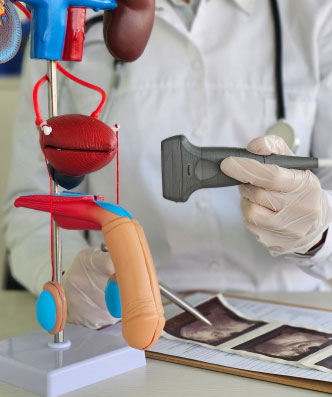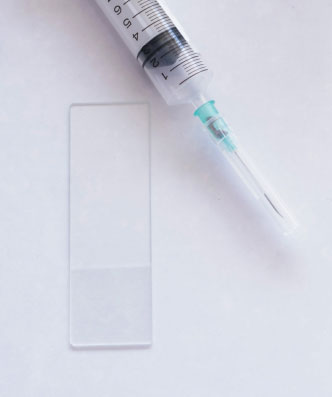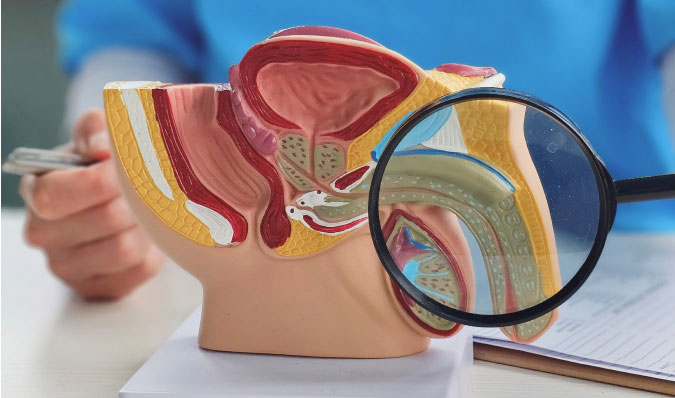Penile Cancer Treatment in Singapore
Effective
Minimally Invasive

of Experience



Care & Support
Penile cancer is a rare but treatable cancer if detected early.

What Is Penile Cancer?
Penile cancer arises from abnormal growth of cells on the penis, most commonly starting on the glans (head of the penis) or the foreskin. The majority of penile cancers are squamous cell carcinomas, a type of skin cancer. In some cases, penile cancer can spread to nearby lymph nodes or other parts of the body if left untreated.
What are the Symptoms of Penile Cancer?
Early symptoms can be subtle and are often mistaken for non-cancerous skin conditions or infections. Common signs include:
- A growth, lump, or ulcer on the penis that does not heal
- Red, velvety, or crusty patches on the penile skin
- Foul-smelling discharge under the foreskin
- Swelling of the penis
- Bleeding from a sore or growth
- Enlarged lymph nodes in the groin area
Men experiencing any of these symptoms should see a urologist promptly. Early treatment can prevent the need for more invasive surgery.

Worried about a lesion or lump?
Call 6518 3622 to arrange a private consultation with our penile cancer specialist.

Who is at Risk of Penile Cancer?
Several factors can increase the risk of developing penile cancer:
- Human Papillomavirus (HPV) infection
- Smoking – linked to immune suppression and cellular changes
- Poor genital hygiene – especially in uncircumcised men
- Phimosis – a tight foreskin that is difficult to retract
- Chronic inflammation or infection
- Age – more common in men over 50
HPV-related penile cancers may be preventable through vaccination and safe sexual practices.
How Is Penile Cancer Diagnosed?
Evaluation includes a physical examination and may involve:

Visual and physical assessment of the lesion

Biopsy of the penile lesion to confirm cancer type

Imaging tests (e.g., ultrasound, MRI, CT scan) to assess the extent of the tumour

Fine-needle aspiration of lymph nodes in the groin if enlarged
Staging of Penile Cancer
Staging refers to how far the cancer has spread and is based on physical findings, biopsy results, and imaging. The stages are primarily:
STAGE 0 (carcinoma in situ)
Abnormal cells are limited to the surface
STAGE 1
Cancer has invaded deeper penile tissues
STAGE 2 – 3
Cancer has spread to nearby tissues or lymph nodes
STAGE 4
Distant spread to other organs
Tumours are also graded (low or high) based on how aggressive they appear under the microscope.
What are the Treatments for Penile Cancer in Singapore?
Treatment depends on the stage and location of the tumour. Options include:
Topical Therapy or Laser Treatment
For very early-stage penile cancer, non-invasive options may be effective. These include:
- Topical chemotherapy applied directly to the lesion to destroy cancer cells
- Laser ablation, which uses high-energy light to precisely remove or destroy cancerous tissue without the need for traditional surgery
Surgical Removal
Surgery remains the most common and effective treatment for penile cancer, with the approach tailored to tumour size, location, and depth:
- Circumcision: Performed if the cancer is limited to the foreskin. This alone may be curative in very early cases.
- Wide local excision: Involves removing the tumour along with a surrounding margin of healthy tissue to reduce the risk of recurrence.
- Glans resurfacing or partial penectomy: Used when the tumour affects the glans or shaft but can still preserve urinary and sexual function.
- Total penectomy: Required in advanced cases where the tumour has deeply invaded penile tissue. Reconstruction options may be discussed post-operatively.
Lymph Node Dissection
Penile cancer often spreads first to the inguinal (groin) lymph nodes. If confirmed, lymph node dissection may be recommended:
- May be done at the time of primary tumour surgery or later
- Helps to determine cancer stage and guide further treatment
- May involve open or minimally invasive techniques, depending on the case
Radiation Therapy
Radiation therapy may be used:
- As a primary treatment in patients who are not candidates for surgery or prefer to avoid it
- After surgery to reduce the risk of recurrence
- For palliative care in advanced disease to relieve symptoms
Chemotherapy
Chemotherapy may be recommended when penile cancer has:
- Spread to lymph nodes or distant organs
- Returned after prior treatments.
- Proven resistant to surgery or radiation
When to See a Urologist for Suspected Penile Cancer?
You should consult a urologist if you experience:
- A persistent lesion, growth, or ulcer on the penis
- Red or crusty patches that don’t go away
- Discomfort or foul discharge under the foreskin
- Swelling or lumps in the groin
Early medical evaluation is essential to rule out cancer and begin treatment if needed.


Our Penile Cancer Specialist
Dr Tan Teck Wei
MBBS (S’pore), DFD (CAW), MRCS (Edin),MMed (Surgery), FAMS (Urology)
Dr Tan Teck Wei is a Senior Consultant Urologist and former Director of Genitourinary Oncology at Tan Tock Seng Hospital. Skilled in the management of penile cancer, Dr Tan strives to provide empathetic and effective care with the patient’s best interests in mind. He is fellowship-trained in open, laparoscopic and robotic urologic surgery; and has held numerous leadership and academic positions. Dr Tan understands the distress faced by patients and their families, and is committed to providing care that is not only medically sound but also supportive, personalised, and attuned to each patient’s circumstances.
FAQs on Penile Cancer
Look for persistent sores, growths, or unusual discharge on the penis, especially if not healing or accompanied by a foul smell.
It is rare, but more common in men over 50 and in those with poor genital hygiene or an HPV infection.
A biopsy is needed to confirm the diagnosis. Your doctor may also do imaging tests to assess for spread.
Treatment may include topical medication, laser therapy, surgery, and sometimes radiation or chemotherapy for advanced cases.
Treatments—especially surgery—can affect urinary and sexual function, depending on the tumour’s location and extent. Whenever possible, procedures aim to preserve penile structure and function.
For enquiries on your condition or appointment booking, please fill in the enquiry form and we will be in touch with you soon. Your health and well-being are our top priorities, and we look forward to assisting you on your medical journey.



